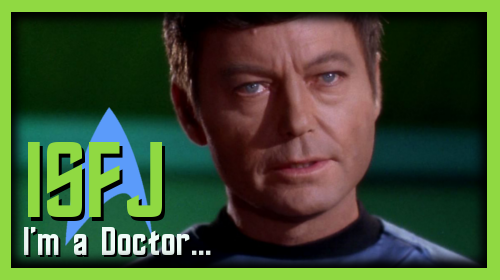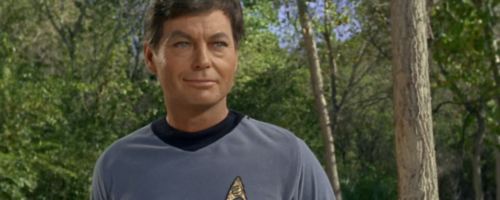
ISFJ – the Protector, the Cultivator, the Steward
McCoy breaks a nice handful of ISFJ stereotypes. For one, he’s not a housewife, obviously. For another, he’s super cranky most of the time. And finally, even though he can be traditional and old-fashioned, he’s also on board a starship exploring strange new worlds.
Dominant Function: (Si) Introverted Sensing, “The Study”

McCoy is fond of referring to himself as a simple “country doctor.” At heart, he’s an old-fashioned Southern gentleman, and he never forgets his roots. He appreciates simple pleasures like a mint julep (“This Side of Paradise”), fresh air and the outdoors (“Shore Leave”), or a good home-cooked, non-replicated meal (“Arena”). He quickly discerns that the lavish spread provided by Trelane has only the appearance, and none of the flavor, of real wine and food.
McCoy’s also infamous for his distrust of technology, despite serving on Starfleet’s most advanced ship. He has particular disdain for the transporter, disliking the idea of his molecules being scrambled and squirted through space. At the same time, McCoy shows disdain for the “medieval” medicine of Earth’s 20th century, because it’s not up to snuff with the technology he knows.
McCoy’s Si-dom makes him a voice of commonsense caution against some of Kirk and Spock’s more hare-brained schemes. Of course, McCoy needs good counsel himself when he’s facing down a monster who looks like his old flame Nancy. McCoy seems to very much want to settle down some day—he’s irritated at being called out of retirement, unlike his friend Kirk, whose dominant Se makes him balk against the idea.
After Kirk gets a desk job, McCoy visits him on his birthday and encourages the once and future captain to, “Get back your command…before you really do grow old.” (ST:II)
Auxiliary Function: (Fe) Extraverted Feeling, “The Garden Fountain”

McCoy’s Fe compels him to help others. That’s the main reason he’s a doctor. It’s also the main reason he’s so stubborn and cranky—he gets frustrated when people won’t do what he knows is best for them.
He tends to the wounds of the Horta, a potentially dangerous creature unlike any other lifeform he’s seen (“The Devil In the Dark”). He stubbornly helps the pregnant Eleen on Capella despite her protests that she would rather die (“Friday’s Child”). And in the middle of an escape from an alternate universe, he makes his fellow crewmembers wait while he tends to an injured enemy, the evil twin version of Spock (“Mirror, Mirror”).
McCoy often scolds his captain for not taking care of himself. He’s one of the few members of the crew besides Spock who gets to speak up to Kirk, offering feeling-based advice in contrast to Spock’s logic. For instance, while Spock shows a scientific fascination with the Genesis Project, McCoy argues the appalling ethical consequences of such a device (Star Trek II: The Wrath of Khan).
It’s a classic dichotomy, brains versus heart, as old as Scarecrow and Tin Man (Kirk would be Dorothy in this comparison, in case you were wondering).
As for Spock, McCoy constantly gets after the Vulcan for not showing proper emotion, calling him a computer or cold-blooded. For an Fe-user, expressing feeling is natural and necessary. Not having an appropriate emotional response at, say, the loss of a crewmember, would be inhumane and offensive. Being the Extraverted Feeler of the two, it’s eventually McCoy who‘s the first to tell the other that he respects him as a fellow officer and values him as a friend (“Bread and Circuses”).
His curmudgeonly reputation aside, McCoy shows genuine warmth for his patients and friends. He’s easy to get along with in his off hours, and connects well with others, including foreign cultures like the Capellans (“Friday’s Child”). Though disoriented due to an accidental drug injection, he charms his way into an immediate friendship with Edith Keeler, a fellow Fe-user, in Depression-Era New York (“The City on the Edge of Forever”). Even while on trial for assassination in a Klingon court, McCoy manages to crack a joke that wins him a laugh from his hostile audience (ST:VI).
He’s no comedian, of course, just a doctor.
Tertiary Function: (Ti) Introverted Thinking, “The Laboratory”

McCoy always leads Feeling-first, and constantly struggles with Spock’s Thinker approach to life’s problems. Yet McCoy applies a sharp mind to solving medical mysteries. He cures the “Grup” disease (“Miri”), deduces the parasites’ methods, motives, and weaknesses (“Operation: Annihilate!”), cleverly “kills” Kirk so that Spock can win his bride (“Amok Time”) and even rigs up controls to run Spock’s body without its brain (“Spock’s Brain”).
He performs a risky surgery on Spock’s father despite not knowing much about Vulcan anatomy. Though he’s at first frustrated by the fact that the Horta is an unfamiliar, silicon-based lifeform, once Kirk reminds him that he’s a healer, McCoy sets to the task and applies concrete to heal her wounds.
“By golly, Jim, I’m beginning to think I can cure a rainy day!” he declares.
Inferior Function: (Ne) Extraverted Intuition, “The Hiking Trails”

McCoy holds many paranoid fears about what will happen to him if he uses the transporter or other technologies. He can grasp the concepts of some of Kirk and Spock’s wilder ideas, but still thinks they’re crazy. He’s also constantly reminding Jim that he’s a doctor, not some other job, revealing a stubbornness at the possibility of having to switch gears for the task at hand.
For all his grouchiness, McCoy’s as interested as the next Starfleet officer in meeting new peoples and new life forms. This is especially so for those that need his medical help. McCoy shows as much adaptability and ingenuity as a certain engineer in finding ways to get his job done.
When last we see McCoy, he’s a 137-year-old admiral taking a tour of the latest Enterprise. His companion is Lt. Cmdr. Data, a Thinker-type who reminds him strongly of his old friend Spock. When he learns that Data is not a Vulcan, but an android, McCoy replies, “Almost as bad.”
But maybe McCoy has grown after all, because he seems to have a good feeling about this android kid and his new ship. “You treat her like a lady,” he tells Data, “and she’ll always bring you home.”